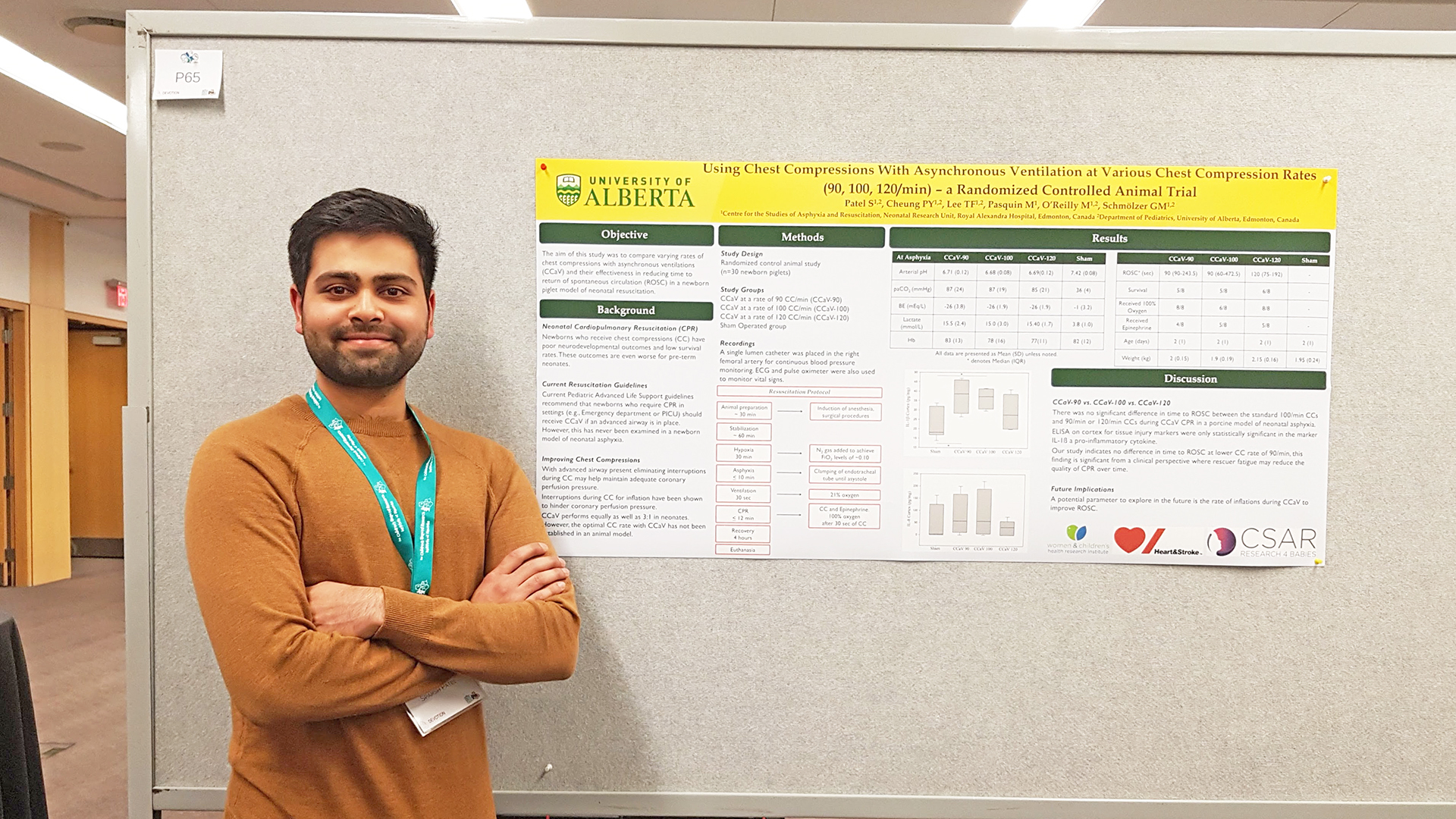Sparsh Patel, '20 M.Sc.
 Student: Sparsh Patel
Student: Sparsh Patel
Program: M.Sc.
Convocation Date: June 12, 2020
Supervisor: Georg Schmölzer
What is your background before coming to this program?
I have a B.Sc. and M.Sc. from the University of Alberta in biological sciences and medical sciences, respectively. My educational aspirations have led me to develop skills in scientific data interpretation, writing, and communication. I am an avid squash player and have participated in numerous squash tournaments in Alberta. I am fluent in English, Gujarati and Hindi.
What led you to decide to take graduate studies in the Department of Pediatrics at the U of A?
I have always been interested in medical practice and research, therefore, it was an easy decision to join Georg Schmölzer's lab. The lab is focused on clinically relevant neonatal resuscitation research. The fact that my education can contribute to an academic field which directly influences clinical practices was my deciding factor. The U of A as an institution, and the way it supports its student body, was also a huge positive factor in my decision to pursue further education at this institute.
What is your thesis title and summary of your research?
Hemodynamic Differences in Recovery Following Chest Compression with Asynchronous Ventilation Using Chest Compression Rates of 90/min, 100/min, or 120/min in a Porcine Model of Neonatal Asphyxia
Neonatal resuscitation involving chest compressions is associated with poor survival and high morbidity. My research involved optimizing chest compression techniques to improve these outcomes. We found that a higher chest compression rate of 120 compressions per minute improved hemodynamic recovery of surviving subjects, however, we did not observe an increase in survival with varying compression rates. This is interesting.
What were some of the highlights of your experience here?
Fellow grad students are a huge source of community and social support. The Pediatric Graduate Students Association was a good source for being connected to grad students from the Department of Pediatrics, as lab spaces for our department are spread around the campus. Both departmental and university-wide 3-Minute Thesis competitions were great for developing a stage presence and learning skills for communicating to a lay audience.
I really enjoyed the campus sports and recreation through the squash club.
My experience working as a grad student gave me a sense of how a larger academic faculty operates and gave me hands-on experience with the academic career path. While also preparing me for transitioning to industry related fields through a plethora of seminars and professional development tools developed specifically for grad students.
What were some of the challenges or things that were harder than you anticipated?
Developing an understanding for interpreting scientific research and differentiating the quality of scientific work was challenging at first. However, the Department of Pediatrics guides this development through a specific course to develop these skills in young scientists.
Learning to communicate scientific ideas to personnel outside the study field was also challenging, but with the support of my supervisor and departmental resources this was also a skill I could develop over the course of my graduate education. Applying for grants, presenting at both national and international conferences were daunting challenges which were essential for my professional growth.
Has your journey's "destination" changed or morphed from what you thought it would be at the beginning?
Yes, going into the program I had an idea of what I wanted to do. I wanted to work on ideas and studies that directly impact medical practice in the real world. However, I had a limited understanding of the professional environments I could work in to make this happen. I am now looking to work in the healthcare industry outside academia, where I can gain further experience and understanding of the healthcare system and innovative approaches to impact real world medical practices.
Do you have any tips or advice for people considering applying to the department graduate program and/or new graduate students entering the program?
Understanding the types of skills you will develop working in a specific lab with a specific research area will help you decide if these are skills that you are interested in developing. The skills you acquire as a graduate student will enable future opportunities.
How has the department prepared you for the next step in your career?
The professional development requirements of the program were great for getting me to think about industry prospects.
Working in an academic environment helped me develop communication skills, as well as confidence in making my ideas and voice heard.
What will you miss about the Department of Pediatrics and your time here?
I miss my fellow grad students, the research, and the collaborative work environment at the University of Alberta Faculty of Medicine and Dentistry.
Where are you headed in your education/career now?
I am currently looking for clinical research, medical science liaison, and research associate positions.